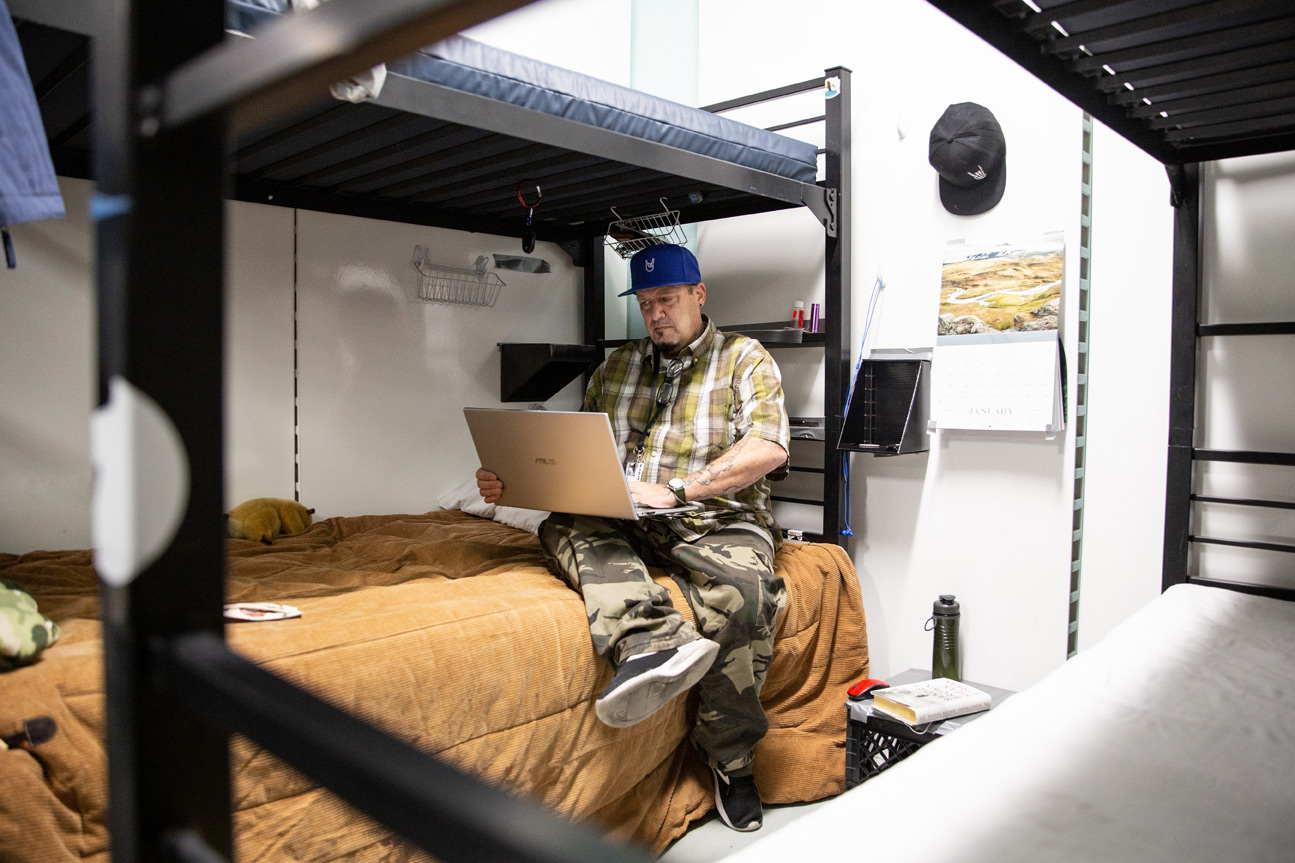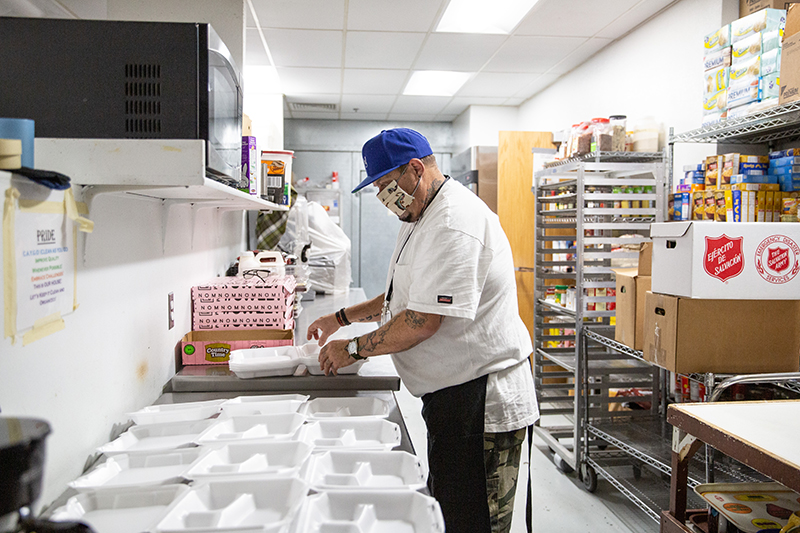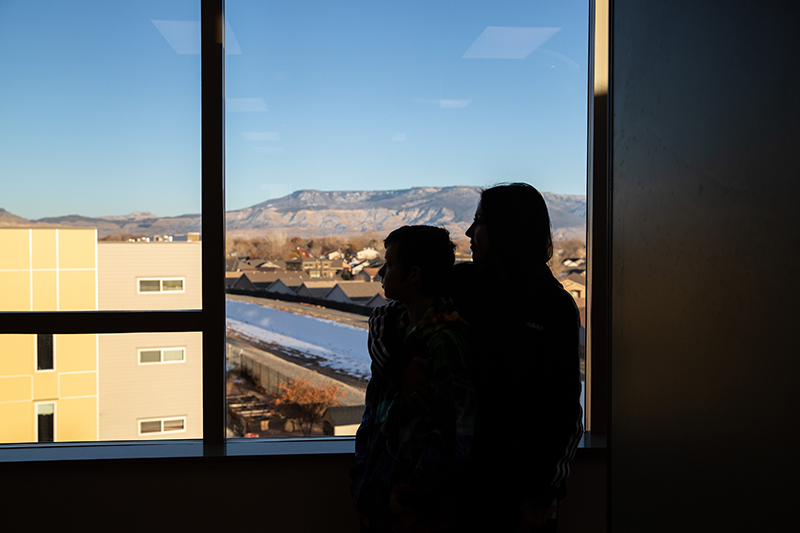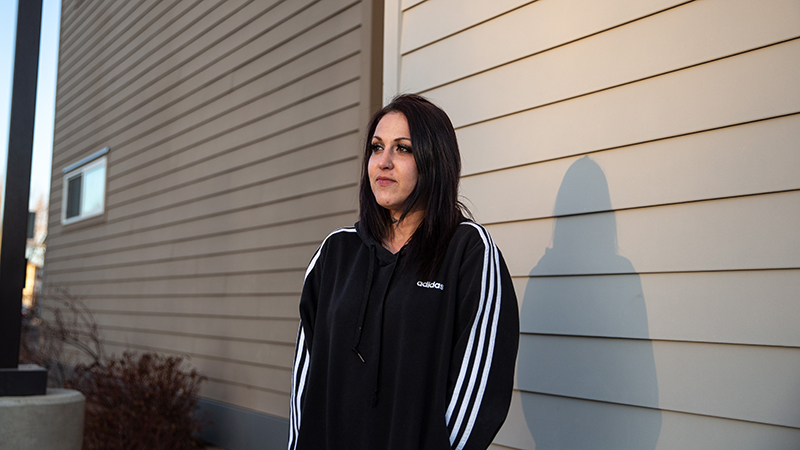
Sean O’Neill has lived at HomewardBound of the Grand Valley’s North Avenue shelter in Grand Junction since June 2020. He lost his job in October after contracting COVID-19. Photos by Luna Anna Archey
Sean O’Neill has lived at HomewardBound of the Grand Valley’s North Avenue shelter in Grand Junction since June 2020. He lost his job in October after contracting COVID-19. Photos by Luna Anna Archey
With many public places closed due to the COVID-19 pandemic, people experiencing homelessness in Grand Junction, the largest city on Colorado’s Western Slope, have fewer places to gather indoors this winter. Meanwhile, shelter staff are working to keep guests safe in congregate living situations where it’s virtually impossible to socially distance.
HomewardBound of the Grand Valley’s North Avenue men’s shelter and its Pathways Family Shelter experienced its first COVID-19 outbreak this fall, with 61 cases by early January among both guests and staff.
Managing the crisis has strained an already understaffed team, after the shelter suspended its volunteer program in April; many of its volunteers were seniors. Additionally, several employees gave notice, due to fears of contracting the virus.
HomewardBound is hoping to prevent further spread of the virus by enforcing mask-wearing and implementing rapid-response coronavirus testing. Guests are tested weekly and employees are tested twice per week. The shelter has enough testing capacity to last at least through January.
Sean O’Neill began staying at the men’s shelter in June. After growing up in the Roaring Fork Valley, the 51-year-old spent 25 years in Arizona before moving to Grand Junction in April to help his elderly mother, who he said was afraid of the virus and “barely making ends meet.” O’Neill moved in with her and began helping both his mother and sister with their expenses—something he could do after securing a job in the hospitality industry, where he said he was earning good money, had a 401k plan and benefits.
A dispute between his mother and another tenant at the senior housing complex led to both O’Neill and his mother moving out in June. She went to Montana to stay with a relative, and O’Neill sought shelter at HomewardBound while continuing to work and save money toward renting a place of his own.
Then, in October, O’Neill starting experiencing “aches and pains and the sniffles” and was diagnosed with COVID-19. He doesn’t know where he contracted the virus; he said it could have been from the store, at work, or the library where he often went during the day to use the computers.
His employer replaced him while he was isolated for two weeks at a local hotel.
“I had a career job,” O’Neill said. “I would have stayed forever. COVID ruined everything.”
He’s glad to be staying at the North Avenue men’s shelter, where, after he recovered from the virus, HomewardBound hired him to help out in the kitchen and serve meals. The shelter has provided stability and emotional support as O’Neill works toward independence.

O’Neill at work in the North Avenue shelter’s kitchen.
“I had a problem with alcohol,” he said. “I was depressed. The people who run this place care. They’ve given me a place. I don’t feel all alone in the world. Because of this place, I’m clean and sober.”
The North Avenue shelter typically serves 100 guests per night while Pathways averages approximately 15 or 16 families each night. The family shelter includes a wellness center and a sober living and support program, both of which received funding from the Colorado Health Foundation. Pathways is also designed to accept single women, although that’s been delayed due to the pandemic, said development director Jesse Redmond, who spoke from home while self-isolating after contracting the virus himself.
Kristina Weber is staying at Pathways with her boyfriend and three children. Weber, 37, started using methamphetamine at age 16, when she lived with her mother in the small Western Slope city of Delta. She met her ex-husband, also a drug user, in Montrose when they were both 18. Although they stopped using when Weber became pregnant, they eventually began “partying” on the weekends and Weber ended up an addict, she said. She became chronically unhoused after leaving her husband.
Weber’s wake-up call came last summer when her 11-year-old son came to live with her after his father kicked him out of the house. She was crashing at a friend’s house at the time. That’s when she finally decided to quit using drugs.
“I didn’t want my kid there,” Weber said. “I woke up one morning and knew I needed to stop. I broke away from everybody.
“The day I came here [to Pathways] is the day I got sober. I was scared; it was the first day of sobriety. I was nervous. It was just me and my son.”

Kristina Weber and her son at HomewardBound’s Pathways shelter for families in Grand Junction.
For the first couple of weeks, mother and child stayed at the North Avenue shelter. When Pathways opened in mid-August they moved to the family shelter. At that point, Weber’s 14- and 16-year-old daughters joined them, leaving their father’s house on their own accord. Weber is currently in the process of stopping her child support payments to her ex-husband, who is remarried with two other children.
There are more rules at the shelter than what the kids are accustomed to, and the 11-year-old doesn’t like wearing a mask. The older girls are afraid of coming down with COVID-19.
“They don’t like to tell anybody that they’re staying here,” Weber said. “Nobody wants to stay at a shelter, but thank God it’s here.”
Pathways has a policy of not breaking up families; thus, men who are part of the family unit can also stay. Weber’s boyfriend found a painting job in Rifle, a one-hour drive from Grand Junction. Weber would drive him to and from work, and take her kids to school. (Weber’s boyfriend and children did not want their names used in this article.)
“We were spending so much on gas,” she said.
After a spike in COVID-19 cases, Mesa County high schools switched to online learning, so Weber’s boyfriend started driving himself to work. She now walks her son to the bus stop, where he catches a ride to his elementary school, which remained open. The girls do their schoolwork at the shelter on school district-issued Chromebooks.
“It’s harder to get kids motivated to do online schooling,” Weber said.
Weber has not used drugs for more than five months. While going through withdrawal, she said HomewardBound staff—many of whom were recovering addicts themselves—would talk to her and calm her down. She recalls waking up from dreams of using.
Weber used to clean houses for a living, but since April, she said people haven’t wanted her inside their houses during the pandemic. She said she hopes to get the business back up and going, “but I’m not sure with COVID.” Weber is also considering taking classes at Colorado Mesa University so she can qualify for a peer-recovery position at Mind Springs Health, coaching recovering addicts. Her boyfriend is looking for a job closer to Grand Junction.
“You can’t understand addiction unless you’ve had addiction,” she said. “It makes you do things you wouldn’t normally do. It would help me feel good to help somebody get out of that.”

Weber has been sober for more than five months and hopes to resume work again soon, either cleaning houses or as an addiction counselor for others.
She attends Narcotics Anonymous meetings twice a month. She said she isn’t worried that her kids will start using drugs. “They see where it took me,” she said. “They don’t want anything to do with it.
“We used to have this good life. There are bad days when they’re upset with the world, but they get it. They know this isn’t permanent.”
The family’s goal is to eventually rent a place of their own, although there’s a lack of affordable housing in Mesa County for low-wage earners.
“Based on the Colorado Division of Housing’s data, our county needs 3,250 more affordable apartments in that income bracket,” said Scott Aker, chief operating officer at Grand Junction Housing Authority. Fewer than 1,500 such units currently exist in Mesa County.
The housing authority owns and manages just under 800 low-income units; it also has 1,300 Section 8 rental vouchers that pay a portion of the rent for qualified applicants—“which leaves another 2,000 households on the wait list,” generally about three years, Aker said.
With Mesa County’s new daily COVID-19 cases often in the triple digits as of early winter, libraries and many other public indoor places have closed, leaving people experiencing homelessness with fewer options of where to go during the day. The Grand Valley Catholic Outreach Soup Kitchen is no longer open for indoor dining, although soup kitchen director Angela Walsh still distributes more than 100 to-go lunches each day.
“It’s hard, especially now that it’s cold outside,” Walsh said. “People feel very displaced.”
Catholic Outreach’s day center has also adjusted its services since the pandemic. Individuals can still come and take showers, check their mail and do laundry, but at a limited capacity. Medical services at the day center, where people had received physical and mental health care, have been suspended.
“The biggest change at the day center is you can’t hang out there,” said Beverly Lampley, the Catholic Outreach director of development and communication. “That’s the hard part. You can’t sit and talk to each other. It’s a real problem, the lack of a place to be; it’s getting cold.”
Lampley said she’s aware of roughly 300 people in Grand Junction who camp outside year-round.
While Pathways’ families can stay there during daytime hours, the men’s shelter closes during the day—although there is a heated outdoor patio area where guests can hang out.
HomewardBound guests who test positive for COVID-19, like O’Neill, are isolated at area hotels under the direction of the Mesa County Health Department, with rooms paid for by the county. HomewardBound continues to care for isolated individuals by bringing meals and conducting wellness checks, says Redmond. One person, who has since recovered, was hospitalized.
As an employee, O’Neill is able to remain inside the North Avenue men’s shelter during the day. He said he feels safe there, and is focused on work and staying positive.
“Right now, you can’t make a lot of plans,” O’Neill said. “Life is at a standstill. We don’t know if the virus will go away, or get worse. So, right now this is the best place I can be.”
Related stories: